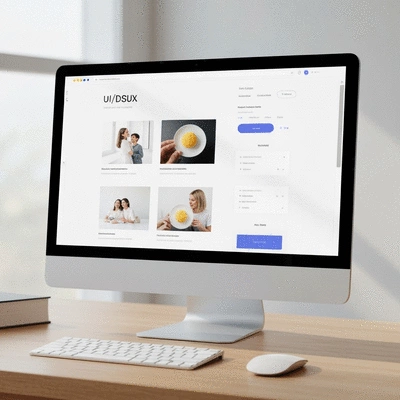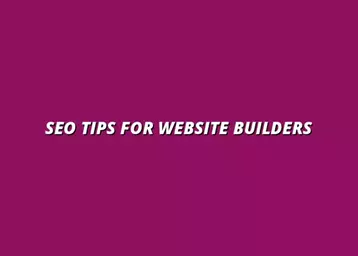Define Your Website’s Purpose
What do you want to achieve? This guides your design and content decisions.
Join Elena Rivers' community for beginner-friendly tutorials, design tips, and free resources to build your stunning website.
Posted on: 2025-08-02
By: Elena Rivers
Statistics show that 75% of users judge a company's credibility based on its website design. A professional website is not just a digital presence; it's a vital tool for building trust and engaging customers. As you embark on your journey to create a stunning online space, here’s what you will learn.
A quick overview of essential phases for creating a professional website:
What do you want to achieve? This guides your design and content decisions.
Choose something that resonates with your brand and is easy to remember.
Consider your needs and budget to find the right hosting provider.
Platforms like WordPress, Wix, or Carrd are great for beginners!
Utilize professionally designed templates that can be customized.
Don’t forget the Home, About, and Contact pages!
Test everything before going live and create a plan to attract visitors.
Regular maintenance keeps your site running smoothly and securely.
Building a professional website can seem overwhelming at first, but understanding the basics is the first step towards creating something remarkable! So, what exactly is a professional website? It's a well-designed, functional site that effectively represents your brand or personal vision online. It matters because your website is often the first point of contact potential clients or customers have with you. A professional site builds trust and credibility, which can lead to more opportunities!
But why stop there? A website can serve multiple purposes, from showcasing your portfolio to acting as a platform for your e-commerce store. It’s about creating a digital space that resonates with your audience and meets your goals. Now, let’s dive deeper into what makes a website truly professional!
A professional website should be visually appealing, easy to navigate, and optimized for different devices. Why does this matter? Because 75% of users judge a company's credibility based on its website design! This not only affects first impressions but also influences user engagement and conversion rates. So, investing time in creating a professional website can pay off significantly in the long run.
Understanding these elements will help you create a site that not only looks good but also functions effectively. Let’s not forget that every element of your site can contribute to the story you want to tell!
Before you embark on your website creation journey, it’s crucial to get familiar with some key terms. This knowledge will empower you and make the process smoother. Here are some essential terms that every beginner should know:
Having a solid grasp of these terms will prepare you for the next steps in your web design journey. Let's keep this momentum going and dive into selecting your domain name and web hosting service!
Your domain name and web hosting are foundational components of your website. Choosing the right domain can set the tone for your brand, while reliable hosting ensures your site runs smoothly. So, how do you select the perfect domain name? Let's break it down!
When it comes to your domain name, simplicity is key. A memorable domain name helps your audience easily find you online. Here are some tips to consider:
By following these simple tips, you’ll be well on your way to creating a domain name that sticks in the minds of your visitors!
Once you've settled on a domain name, it's time to register it! Here are some tips to ensure a smooth registration process:
Taking these steps will help protect your investment and give you peace of mind as you launch your new website!
Next up, let’s talk about web hosting. This is where your website files are stored, and choosing the right service is essential for your site’s performance. Here are a few key factors to consider when selecting a hosting service:
Once you find a suitable hosting provider, you'll be on your way to making your website accessible to the world!
When it comes to hosting options, you typically have three main types: Shared, VPS, and Dedicated. Here’s a quick overview to help you choose the right one:
| Hosting Type | Best For | Pros | Cons |
|---|---|---|---|
| Shared | Beginners and small websites | Cost-effective, easy to set up | Limited resources, shared traffic |
| VPS | Growing sites with moderate traffic | More resources, better performance | Higher cost, requires more technical knowledge |
| Dedicated | Large businesses and high-traffic websites | Full control, maximum resources | Expensive, requires technical expertise |
Choosing the right hosting option will depend on your specific needs and budget. Don’t hesitate to ask questions or seek advice if you’re unsure!
Lastly, let’s discuss the importance of SSL certificates. An SSL certificate is essential for encrypting data and protecting your website visitors. Here’s why it matters:
Incorporating an SSL certificate into your web hosting plan is a smart move that can enhance your website’s security and credibility.
As you embark on your website creation journey, we’d love to know: What is the most challenging aspect of building your website so far? Share your thoughts below:
Building a website is an exciting journey, and it’s important to remember the key steps that can help you along the way. If you’ve followed the previous sections, you’re already on the right track! To recap, let’s take a look at the essential phases of creating a professional website that truly reflects your vision.
Here’s a quick summary of the website creation process for beginners:
By keeping these steps in mind, you can confidently move forward in your website creation journey. Remember, I’m here to support you through this process!
Congratulations on launching your website! You’ve made a significant achievement, and now it’s time to take the next steps to ensure its success. After going live, there are several resources you can tap into for continued learning and improvement.
Here are some valuable resources to consider:
Investing time in these resources can greatly enhance your skills and keep your website current. Just like I’ve done with Website Design Free, continually seek out opportunities to improve!
Now that you’ve launched your website, I’d love to hear from you! What challenges did you face, and what successes have you celebrated? Your experiences can inspire others on their journey to creating a professional online presence.
Feel free to share your thoughts, questions, or even your website link in the comments below. I’m here to help you navigate this process, and your input creates a sense of community that we all can benefit from. Let’s keep the conversation going!
Here is a quick recap of the important points discussed in the article:



 As the digital landscape continues to evolve, understanding the nuances of SEO becomes vital for any
As the digital landscape continues to evolve, understanding the nuances of SEO becomes vital for any
 Effective design is not just about aesthetics; it plays a crucial role in guiding user behavior and
Effective design is not just about aesthetics; it plays a crucial role in guiding user behavior and
 Choosing the right website builder can be pivotal for your online success. Whether you're a novice o
Choosing the right website builder can be pivotal for your online success. Whether you're a novice o